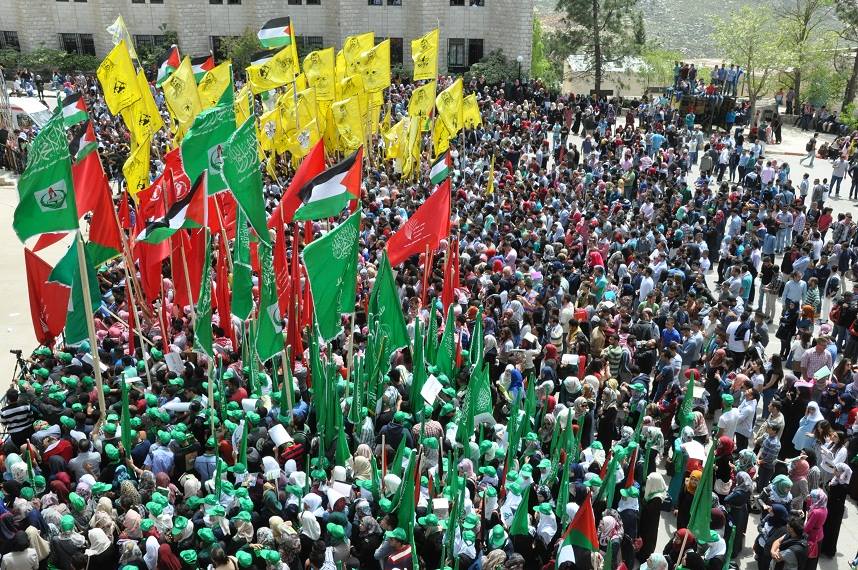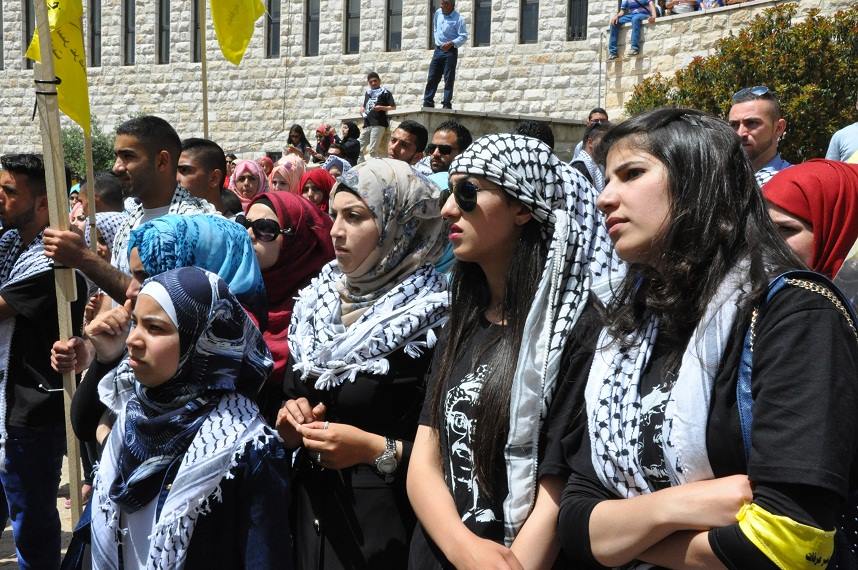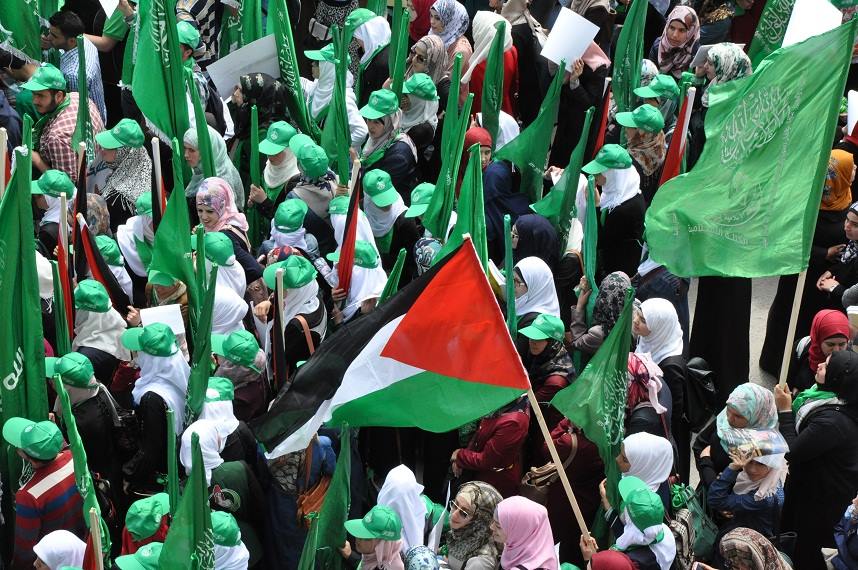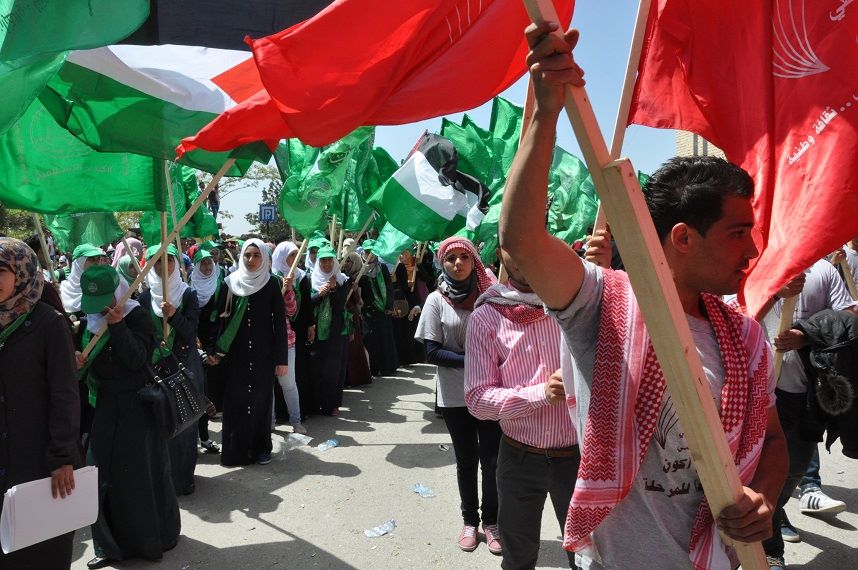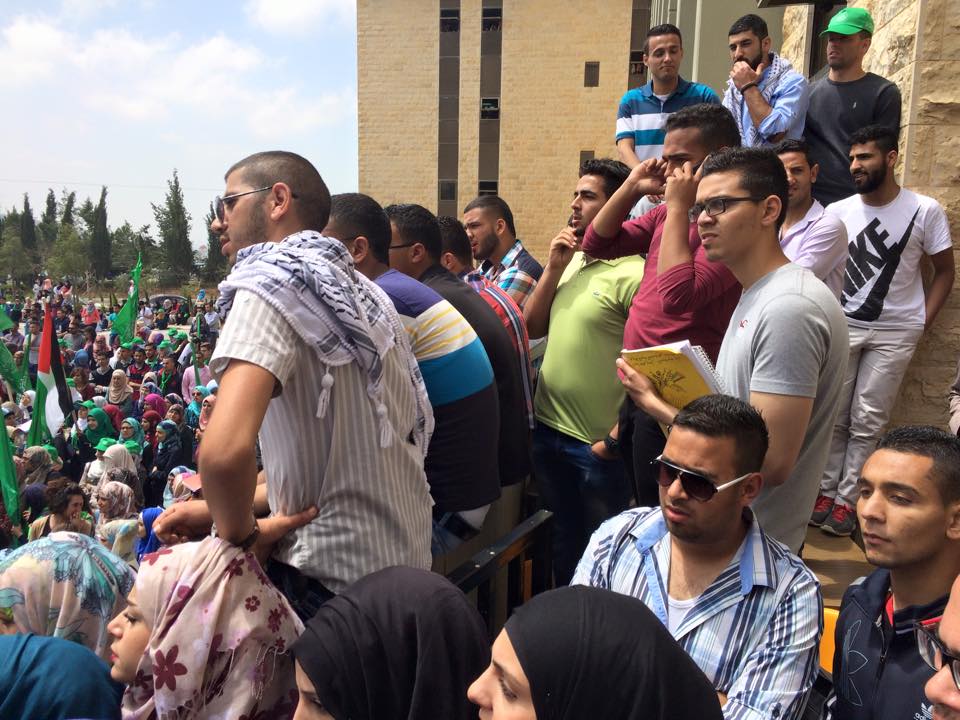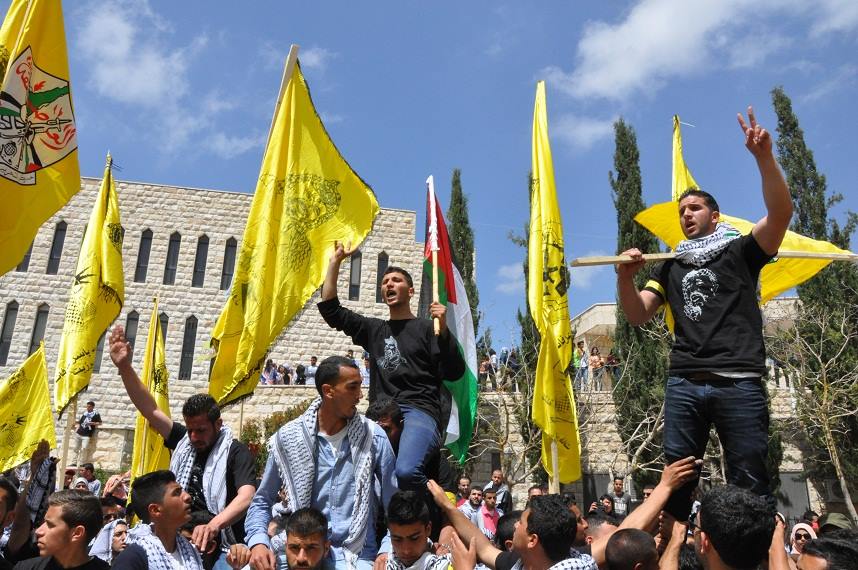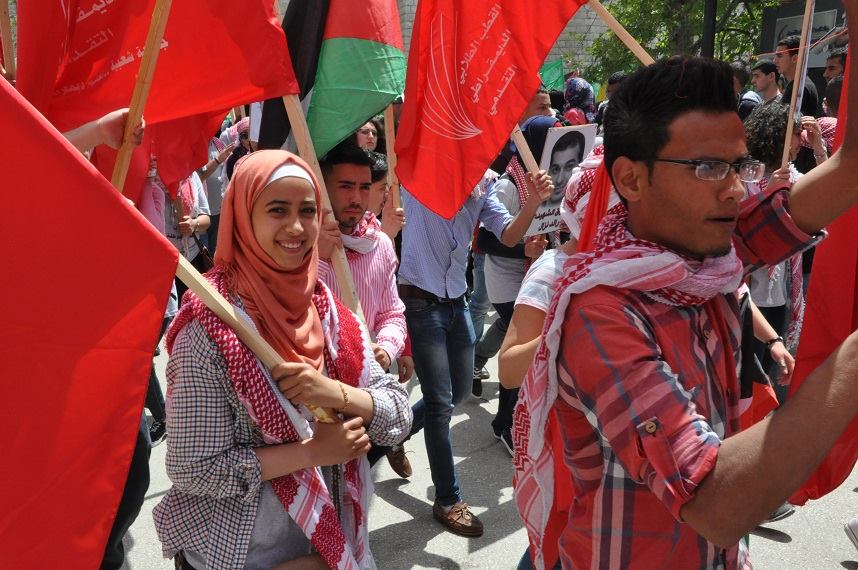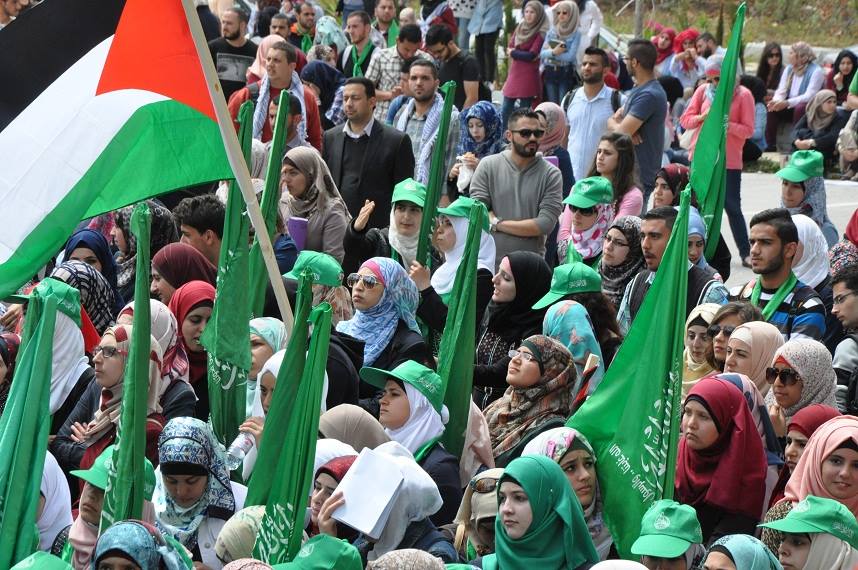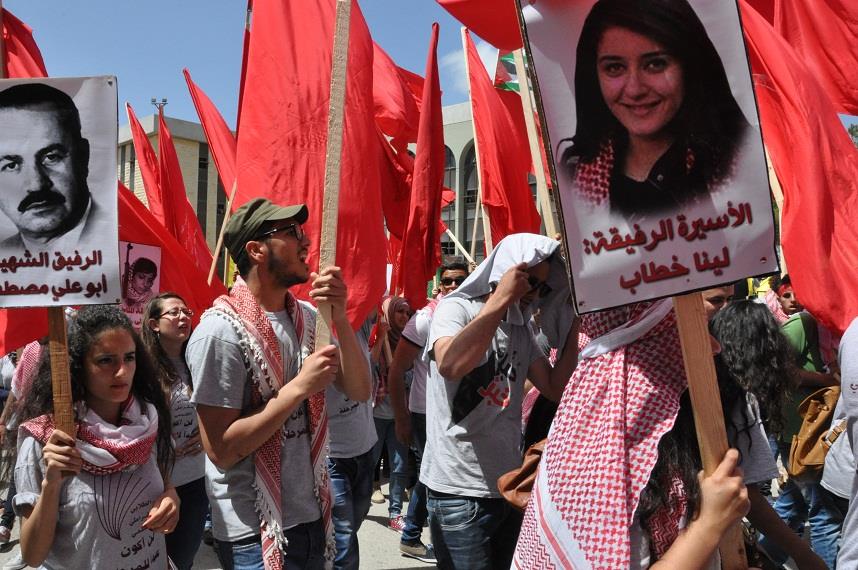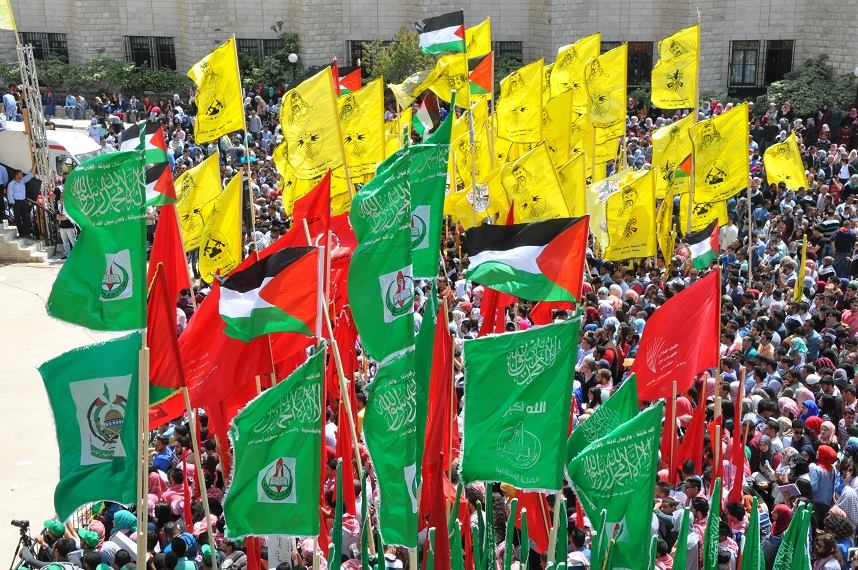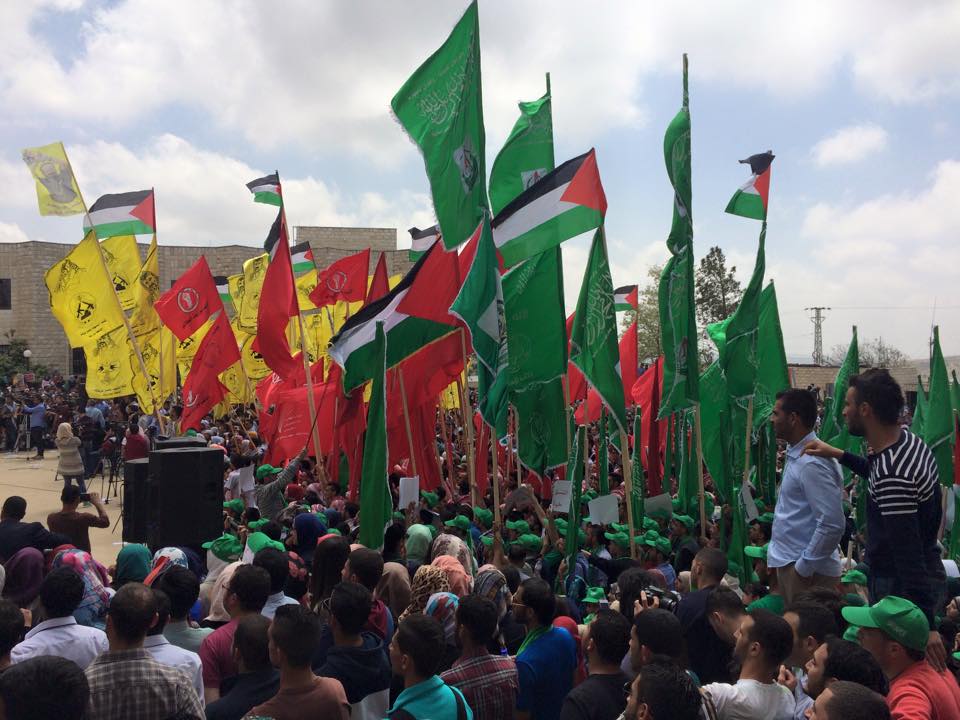BETHLEHEM (Ma’an) — It has been nine years since Palestine’s second and last parliamentary elections in 2006, and although hopes were raised for a new vote following a national unity deal last year, few have faith that they will be held anytime soon.
The nation’s democratic hopes are kept alive, however, in university competitions across the West Bank, watched closely by observers as indicators of shifting political trends in the national mood.
Last month, Hamas scored a major political upset when a student affiliate group cruised to victory in elections at Birzeit University near Ramallah, considered the country’s most prestigious university and an incubator of the nation’s future elite.
But at other campuses in the central and southern West Bank, Fatah-affiliated groups maintained their grip on power and leftist parties made some surprising gains.
While some criticize the politicization of student elections by outside bodies and the increasing levels of corruption that many see tainting the competitions as a result, for Palestinians, the elections remain a key way to make their voice heard in a land where Israeli occupation and political stagnation have too often tried to silence.
Pulse of the nation
Khalil Rantissi, a master’s student in diplomacy at Birzeit University, told Ma’an that Palestinian parties see the competitions as an opportunity to prove their relative popularity, especially amid constant claims from both sides that the other’s strategy in improving the Palestinian situation has failed.
In the absence of national competitions, student elections are hotly-contested by student groups affiliated with each party and are treated as a barometer of each group’s popularity.
Nowhere is this clearer than at Birzeit, which in recent years has emerged as the most respected competition.
“The elections at Birzeit University are always dramatic,” Rantissi told Ma’an. “Since it’s close to Ramallah, which is considered to be the political capital of the Palestinian Authority, the elections are extremely sensitive.”
“All of the parties (that exist) off campus take the elections as a popular referendum, so they all take part. Even the small parties that can’t get a single seat take part just to prove their existence.”
In the most recent vote on April 22, Hamas scored 26 seats compared to Fatah’s 19, while the list affiliated with the leftist Popular Front for the Liberation of Palestine (PFLP) received five and a coalition of other leftist parties got one.
Analysts hailed the narrow upset at what was once considered a Fatah stronghold as a sign of shifting fortunes, with Hamas leaders citing the group’s struggle against the bloody Israeli offensive against Gaza over summer as a key to its success.
Few interpreted the results in the context of university issues.
Rantissi told Ma’an that outside political parties pour money into their respective groups on campus to increase their visibility, with massive posters, flags, and even handouts of small items like pens and keffiyehs a common occurrence in the weeks leading up to the campaign.
Critics charge that as a result, Birzeit student elections are increasingly about national issues and rarely tackle the topics affecting students’ lives.
Questioned by Ma’an about the platforms of their student groups before the elections, both Hamas and Fatah representatives on campus stressed the actions and achievements of their national movements and noted that student votes for the parties were “expressions” of student support for these goals.
The Hamas representative, for example, cited widespread support for the group’s military resistance, while the Fatah representative highlighted the group’s long history of “revolutionary” activism.
A representative for the student group affiliated with the PFLP was the only one of the three representatives interviewed to focus on projects directly benefiting students, including subsidized textbooks and organizing rallies in solidarity with students held in Israeli prisons.
The group counts among its ranks one of the most prominent Palestinian student prisoners, 18-year-old Lina Khattab who was arrested and sentenced for six months after taking part in a demonstration against land confiscation in December.
Her case highlights the difficulties in drawing clear-cut lines between student politics and national politics, as for many, the struggle to improve education and campus life is intimately connected to the fight for a Palestine free of occupation.
More than two dozen Birzeit students have been shot dead by Israeli forces in the university’s history, in addition to the hundreds more detained, and a nearby checkpoint has in the past been frequently closed shut in order to block access.
Just last summer, Israeli forces conducted raids inside the campus itself, while students from a variety of political backgrounds are commonly detained as punishment for their activism.
The political pressure is not just from Israel. In the one month since the Hamas student group won the election, more than two dozen of its student members have been detained by Palestinian security forces, who are controlled by the West Bank’s Fatah-led Palestinian Authority.
“It is deeply worrying that students are being held by Palestinian forces for no apparent reason other than their connection to Hamas or their opinions,” Human Rights Watch’s regional director Sarah Leah Whitson said in a statement on May 7.
A Hamas statement released on the occasion of the group’s victory in the student contests, meanwhile, called the victory “evidence that the party is stronger and bigger than all attempts to remove it” and noted that activists had persevered in spite of repression by the Palestinian Authority.
The prominence of Brizeit, however, is derived from the fact that very few other universities hold transparent elections. In Gaza, for example, the same Hamas authorities that condemn repression against Hamas students in the West Bank have prevented student elections there for nearly a decade.
Other West Bank university elections, meanwhile, are marred by widespread allegations of corruption, vote fixing, and even intimidation by Palestinian security forces acting on behalf of local Fatah leaders.
Hamas abstains from elections at Bethlehem and Al-Quds Abu Dis universities, meanwhile, for reasons some say are linked to their lack of popularity at either school.
A tale of two women
The Hamas victory at Birzeit has been hailed as an indicator of major changes in Palestinian youth attitudes toward everything from negotiations with Israel to rockets to Islamist politics and beyond.
And while it’s certainly possible that the elections herald disillusionment with Fatah’s politics-as-usual in the West Bank — much like the Hamas victory in the 2006 elections did — attempts to understand student elections through the national perspective obscure the very local aspect of any such competition.
Hamas’ victory at Birzeit was presaged by two major controversies that embroiled the Fatah-affiliated group as a result of actions and statements made the day before the vote.
The first was the decision of a Facebook group affiliated with the group to post a picture that showed a blonde female student wearing tight clothes waving the Hamas flag during the debate the day before the elections. The caption mocked Hamas for the supposed indecency of its supporters, and some of the images shared compared the picture with those of Fatah women marching with keffiyehs covering their faces.
The images attracted national attention and led to a widespread debate about the relationship of women’s clothing to political preference.
But at cosmopolitan Birzeit — where both women with hair uncovered and women wearing hijab can be found in every single party, and where political affiliation is seen more as a matter of political belief and less an expression of piety — the debate was met with a great deal of eye rolling and annoyance.
The irony of the fact that it was the supposedly secular, revolutionary Fatah party that was shaming a woman for how she dressed was not lost on many observers.
Hala Jada, an instructor in the business faculty, told Ma’an that the sexist incident contributed to Hamas’ victory in the elections.
“They were very disrespectful,” she said. “She has the right to choose whatever party she wants. Most people I know, even freshman, didn’t like what they did.”
During the debate, meanwhile, a Fatah student leader misidentified the 18-year-old student in Israeli prison, Lina Khattab, as a different student named Lina known for being popular.
The gaffe was seen by some as an insult to the sacrifice of the imprisoned student, who has become a cause celebre for freedom of speech among Palestinian students.
Jada, who is politically unaffiliated and told Ma’an she is disillusioned with any of the choices on offer, argued that contrary to being a referendum on Fatah rule in the West Bank, the Hamas victory was strongly aided by perceived “disrespect” to women and toward Palestinians imprisoned in Israeli jails, who number nearly 6,000 in total.
Analyses of the elections that view the vote in a national context — including statements released by all parties involved — have largely failed to take such issues into account.
Another trend that escaped the notice of many in the recent wave of West Bank elections has been the rise in popularity of leftist parties among Palestinian students.
Once a dominant presence in Palestinian politics, leftist parties have seen their strength wither amid the broader weakening of the global left since the collapse of the Soviet Union in the early 1990s. The heavy repression by Israeli authorities against leftist activists as well as the rise of Islamist politics across the Middle East in the late 1980s, in turn, have largely relegated them to the political margin.
Despite this, leftist parties such as the Popular Front for the Liberation of Palestine (PFLP), the Democratic Front for the Liberation of Palestine (DFLP), and the Palestinian People’s Party (PPP) continue to maintain strongholds in villages, refugee camps, and urban neighborhoods across the country, often known as “red citadels.”
In the last decade, amid the political split between Fatah and Hamas, leftist parties emerged as a bridge between the two, and have sought to exploit disillusionment with both parties to attract voters.
In the recent student elections, the strategy appears to have borne some fruit. Amanda Manasra is the regional coordinator of the youth branch of the communist Palestine People’s Party and a student at Al Quds University’s Abu Dis campus.
Historically known as a Fatah stronghold, leftist parties still managed to capture 14 seats out of a total of 51. While this may not offer them a leading voice, it does ensure that they get a say.
“Abu Dis is infested with Palestinian Authority officials,” Manasra told Ma’an. “It is known as the Fatah university and it has lot of people who work for the PA — preventive security, intelligence, and police.”
Despite the left’s failure to secure a majority or even a plurality, Manasra said: “I still consider the elections a victory for the left, because in the midst of everything wrong that is happening and everything that the PA does to support Fatah, it’s an accomplishment.”
“With the money that Fatah pumps into elections and with the scare tactics, it’s still a victory. … As long as we’re still getting seats in elections, it’s a good thing.”
Manasra expressed frustration that despite witnessing the widespread corruption endemic in the Palestinian Authority and local Fatah affiliates, few students switched political allegiance or explored the other options available to them.
“After seeing what Fatah did after the last election — intimidation, harassment, and tactics that the Israeli intelligence uses with Palestinians like attacking someone’s reputation, carrying out political arrests, sexual harassment, and voter fraud — we expected people to come and vote against Fatah, but people didn’t.”
“A lot of people still vote for Fatah because they don’t believe in the left. … And a lot of people don’t want to vote for Hamas, they just vote for Hamas because it’s not Fatah. And people say, ‘if not these two, who are the leftists?'”
